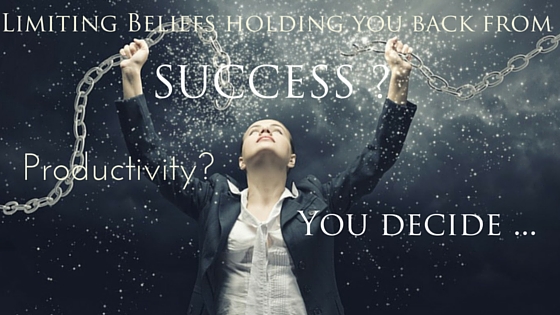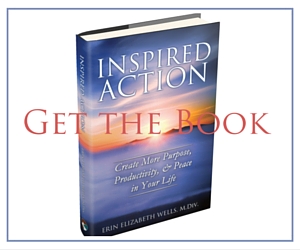Have you heard people talk about limiting beliefs or improving their mindset for success? Were you inclined to scoff and pass it off as more “woo-woo” nonsense from some personal development guru?
Guess what… it’s time to stop your scoffing because I have seen for a fact the role that “beliefs” can play in impacting your productivity decisions. In many ways, productivity is the least woo-woo topic out there. It’s about how we get things done after all… very action-oriented and concrete. However, some of that stuff that you might have thought of as fluffy foolishness may be exactly what’s getting in the way of your effectiveness.
That’s because our beliefs drive our decision-making. For example, if you believe “I always procrastinate,” what do you think is likely to happen when your next big project comes up?
Or what if you say to yourself “My To-do list is a horror.” Do you think you’re going to be excited to review it and get stuff done everyday if that’s how you think about it?
If somewhere in your heart you believe “I don’t deserve to sit down and relax,” is it any wonder that you might be working yourself into a breakdown by constantly racing around?
Do you see what I mean about the impact that your beliefs might have on your productivity?
The Formula
Let me make this more clear by laying out the basic formula. Here’s how our lives work:
Beliefs -> Decisions -> Actions -> Results
For good or ill, our beliefs determine our decisions. Our decisions define our actions, which then create our results. So, if you start with a disempowering belief, then you’re likely to make an ineffective decision. That decision will lead you into taking (or not taking) action, which will create your results (or lack there of.)
Let’s use a concrete example…
Belief – I always procrastinate.
Decision – Since I’ve always procrastinated before, I’m going to wait to start that big project a while longer.
Action – Avoid the project until the last minute.
Result – Increased anxiety & stress in the last few days before the deadline trying to get the project done.
How might the outcome be different if we started with a different belief?
Belief – I consistently get my work done ahead of time.
Decision – Since getting my work done early is important to me, I’m going to start on that project immediately.
Action – The project gets started earlier.
Result – The project gets completed ahead of schedule and with less anxiety and stress.
Can you see the difference? In some ways, this is a rather simplistic example. But, it’s also true and makes it easy to see the impact that the original belief has on the outcome.
How Do You Change Beliefs?
First, you have to recognize what the belief is that’s driving your decision-making. This part can be a bit tricky because it’s about getting curious, honest, and real with yourself. Sometimes we know immediately when there’s a belief that’s been holding us back for a long time… it’s that icky thing you’ve been saying to yourself over and over again. (i.e. I’m not good enough. I always screw things up. It’s hopeless. I can’t X because Y. etc…)
Sometimes limiting beliefs operate like a computer virus in our minds. They’re so sneaky that we don’t even realize that they’re there and messing with how we are functioning. So, unearthing limiting beliefs can take a bit of sustained curiosity, self-reflection, or support to find. During my Success Alignment Intensives I work with clients to identify and transform some of those deeply-installed limiting beliefs, which can be an enormously powerful process.
Once, you’ve identified a limiting belief that’s been holding you back, the first thing to do is question it. Create an empowering question that opens some space around it. Let me give you some examples:
I always procrastinate. – Always? Was there ever a time that you finished early? What would happen differently if you did want to finish early?
I’m not good enough. – What would I do differently if I did believe that I’m good enough? How could I make progress on doing that?
It’s hopeless. – What could I do that might make it possible? What would I do first to accomplish that?
Act As If
Sometimes the best way to challenge a limiting belief is to figure out its opposite and start acting as if that were actually true. Notice that’s a theme behind the questions above… What if the opposite were true? What would you do differently? If you start taking action on the opposite of your limiting belief, then you are defying the old programming.
If this new way of thinking and acting becomes a daily practice, then it starts to create new results which the allows the old belief to dissolve in the face of this new reality you’ve created. You are intentionally reprogramming yourself with a more empowering belief by acting “as if” it were true.
While there are many tools and techniques that I use with my clients to help make this process even easier, at its most basic level this is the solution for overcoming any disempowering belief.
Next Actions
Now, I’m not saying that this is easy. Acting “as if” the new more empowering belief were true takes both courage and persistence at times, but when you start getting the better results you were hoping for they become their own reward.
Take a deep breath, and ask yourself… what limiting belief has been holding me back? Then, question it, challenge it, and find its opposite more empowering counterpart. Then, get curious and figure out how you can start taking action on that alternative today.
Bottom-line: don’t let your old beliefs hold you back from creating the life you want. Question them, and if necessary, ask for help.
Image used under License Agreement: © Stockfresh



